Click to view the full Global University Employability Ranking 2017
Across the world, higher education is increasingly being judged through the lens of employability. More and more, politicians are asking universities how they are preparing students for work, and even tying their funding to their graduates’ success in the workplace.
In the West, this has mainly been a result of the squeeze on the public purse and – in some countries, at least – an accompanying rise in tuition fees. But there is also growing anxiety about the technological revolution’s potential to replace large numbers of human workers with computers and robots if humans can’t keep one step ahead in the race to acquire skills.
So how well are universities meeting the challenge of preparing graduates for the digital age? This is an issue that this year’s Global University Employability Survey - designed by French human resources company Emerging, conducted by research institute Trendence and published exclusively in Times Higher Education - has sought to address.
The survey ranks universities based on the perceptions of both national and international companies about the employability of their graduates. The California Institute of Technology retains its position at the top of the ranking: one of seven US universities in the top 10, and one of a number of technical universities that, perhaps unsurprisingly, rank highly. The Massachusetts Institute of Technology is fourth on the list; Stanford University, famed for its Silicon Valley-bound tech graduates, is seventh; the Technical University of Munich is eighth and the Hong Kong University of Science and Technology is 12th.
Survey respondents, from a range of firms and industries, were also asked a host of questions about the skills that they believe graduates need if they are to adapt to the digital revolution, and which countries and institutions they feel are best preparing students for it.
Regarding the latter question, the Technion Israel Institute of Technology is rated highest, with the Korea Advanced Institute of Science and Technology (KAIST) and UCL coming joint second (see graph below).
Best universities for digital skills
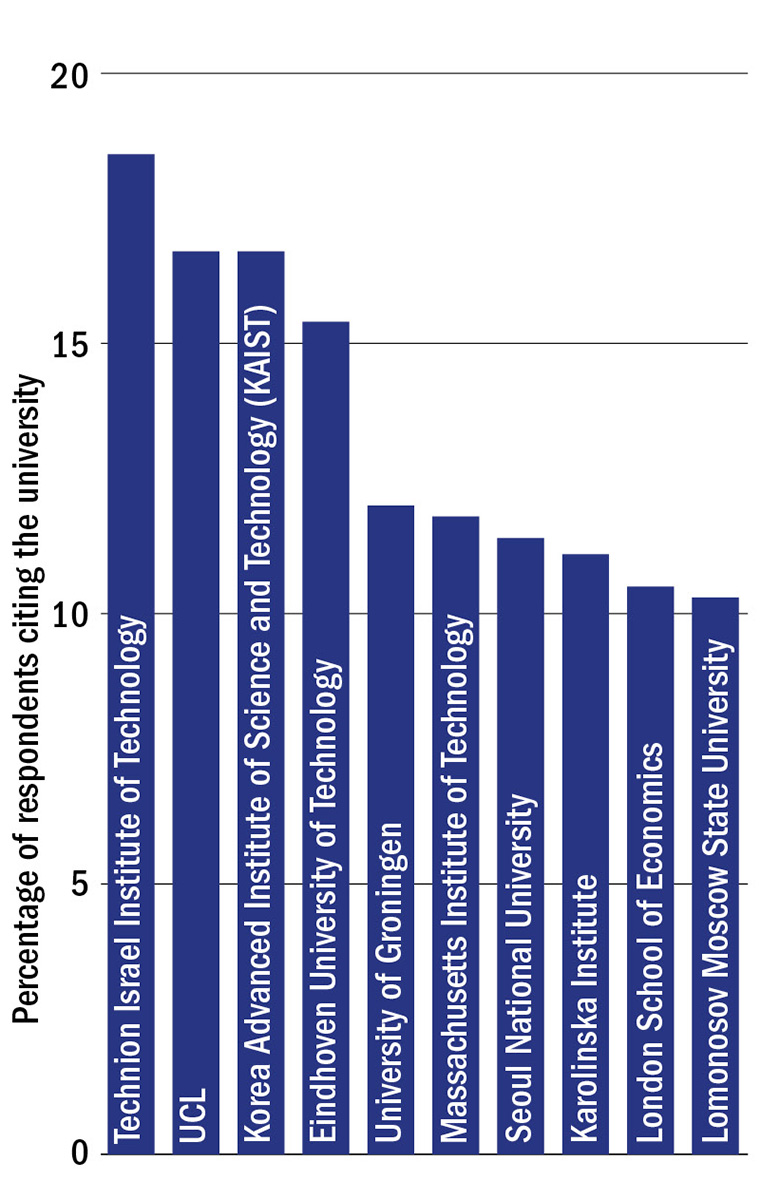
Note: Respondents could name more than one university
The only US representative in the top 10, MIT, is sixth. However, at a country level, there is a clear view worldwide that US universities are leading the way in addressing the digital skills revolution (see graph below). According to Laurent Dupasquier, associate director of Emerging, US institutions have clearly recognised that “in 20 or 30 years’ time a huge number of jobs will have disappeared and a whole load of new jobs will have been created that we can’t even envisage now.”
However, he points out that the skills that employers are looking for in the new digital landscape need to be broken down into the pure technical knowledge needed to drive innovation, and the softer attributes such as adaptability, teamwork and problem-solving that will be vital to ensure that human employees maintain their edge on the robots.
In your opinion, which of these countries are ahead in the digital skills revolution?
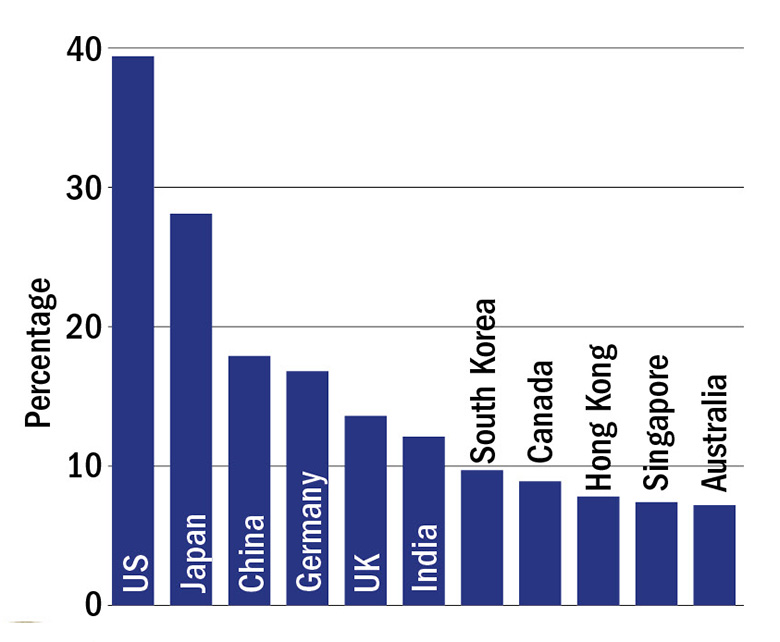
Note: Respondents could name more than one country.
The survey also probes the technical skills gaps that firms are struggling to fill. It is notable that despite the zeitgeist surrounding artificial intelligence and machine learning, which underpins the so-called Fourth Industrial Revolution, these fields do not appear to have the biggest shortages of graduate talent. Instead, network and information security features highest (see graph below), as firms grapple with the threat to their intellectual property and their customers’ privacy posed by hackers (although for managers particularly concerned about the digital competency of graduates, data engineering is a slightly greater priority still, as the big data revolution advances).
However, skills gaps vary greatly by country. For instance, Chinese employers most struggle to fill AI jobs, possibly as a result of the country’s well-documented push in this area . In the UK and US, data engineers are in highest demand, while India appears to be short of graduates in all the main fields apart from AI, despite being renowned for producing thousands of graduates with coding and programming skills. Part of the explanation for that may be that many such graduates seek higher-paid work abroad.
Specialisms in which employers struggle most to find graduates
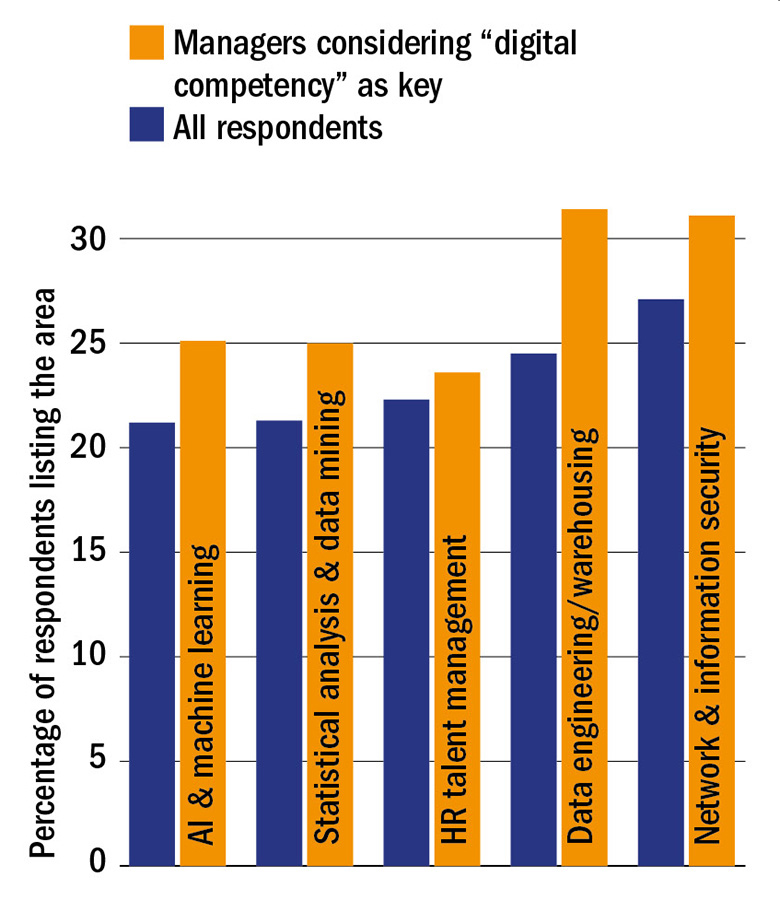
Note: Respondents ranked each area on a six-point scale. The graphic shows the percentage of respondents picking values five and six for each area, with six being the most important. Respondents could name more than one area.
According to Tom Morrison-Bell, head of public affairs for techUK, a body representing almost 1,000 firms employing about 700,000 people in the UK digital sector, firms themselves are increasingly training new employees in the cutting-edge techniques and programming languages that they need. However, he says, it is still vital that universities provide a solid base of knowledge to build on.
“Undergraduate courses need to make sure that they [teach] the basic technical skills across the coding languages that are…broadly required,” he says.
UK firms, he adds, have often recruited from abroad to make up for a shortfall in the number of home-grown graduates with the right skills. A report published by the organisation earlier this year showed that in the country’s “digitally intensive sectors” – which includes financial services – about 18 per cent of the workforce is from abroad, compared with 16 per cent for the whole economy. Since a third of those overseas workers are from the European Union, any immigration barriers that go up after Brexit will put the onus further on UK universities to produce graduates with the right tech skill sets, Morrison-Bell says, if the country is to maintain its position as “Europe’s leading digital economy”.
He adds that tech firms increasingly want graduates who also have strong soft skills, such as the ability to manage projects and clients, which become invaluable as employees move through the ranks. Such graduates, he notes, are less likely to be made redundant by the automation of technical skills, too.
Skills shortage: specialisms in which employers struggle most to find graduates
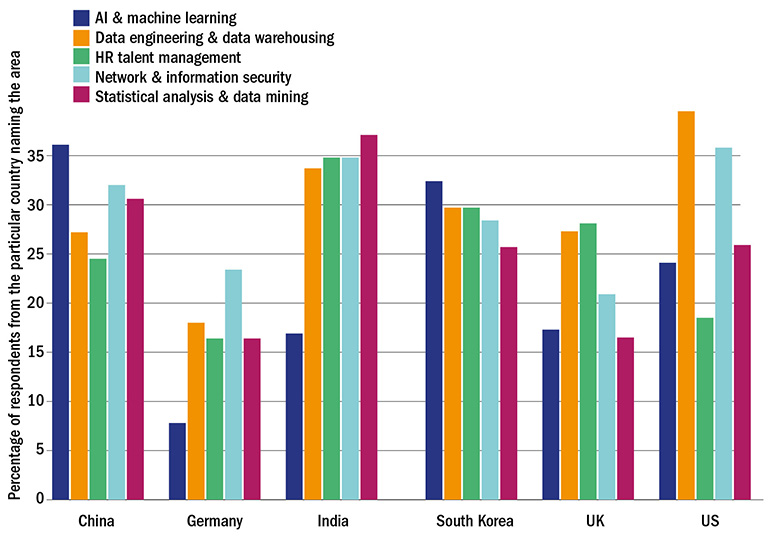
Note: Respondents ranked each area on a six-point scale. The graphic shows the percentage of respondents picking values five and six for each area, with six being the highest.
Rose Luckin, professor of learner-centred design at the UCL Institute of Education, also stresses that even graduates with computing skills need to cultivate their human advantage.
“The impact of AI and automation more broadly means that there is a general need for graduates to come with a more flexible skill set, [enabling them] to move between roles quite agilely and to work in teams to solve problems more collaboratively,” says Luckin, a leading expert on the use of AI in education technology.
She adds that another key graduate attribute will be an ability to continually learn and self-teach.
“Being a good learner is going to be really in demand because we don’t know exactly what jobs there are going to be in the future and exactly what skills and expertise you’ll need,” she says. “That might seem obvious, but not everybody is [able to teach themselves].”
So how well are universities currently preparing graduates for this ever-changing world of work, according to the firms that will – hopefully – employ them?
Emerging’s survey suggests that the critical thinking and analytical skills that a degree is traditionally thought to instil are still very relevant (see graph below). This is a view shared by Shuvo Saha, director of the Google Digital Academy, which offers courses on digital expertise at the tech giant’s various European offices. However, Saha believes that universities are still some way behind in helping students to practise the interdisciplinary and collaborative methods of working that are becoming central to the success of modern firms.
Wish list: skills that graduates need most for the digital age
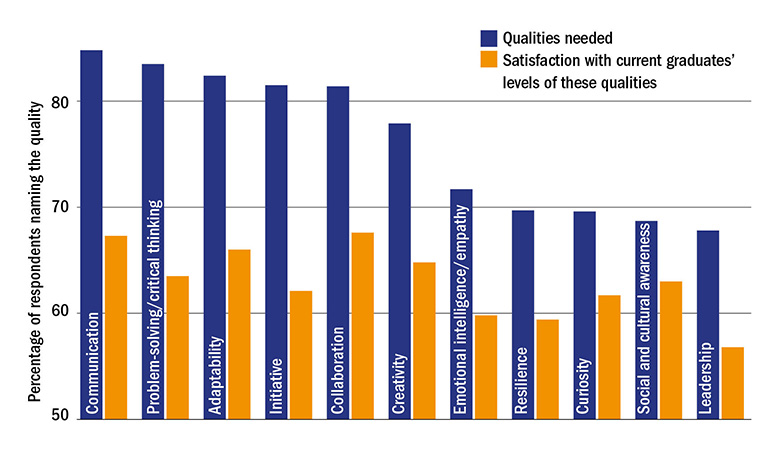
Note: Respondents ranked each area on a six-point scale. The graphic shows the percentage of respondents picking values five and six for each area, with six being the most important.
“The way organisations have to work these days needs to be very fluid. In that kind of world it is important to have people who are really flexible, able to create networks within their organisations and very comfortable working in virtual teams and particularly [what we call] leading beyond authority: not necessarily having to get things done because they are in a team that has a boss,” he says.
But he is “not sure” that the implications of this are “well understood by the academic world and, therefore, when we throw a new graduate into [work] it can be quite overwhelming [for the graduate]”. One solution, he suggests, is for university courses to have more group projects, with assessment focused on the process that the participants go through, rather than the outcome.
Flourishing in such an environment requires “reflection and understanding”, and especially learning from mistakes, Saha says. He is sceptical that this aspect of professional competence is well explored in universities currently, but “in the working world, that is the bit that can be make or break”.
KAIST is one institution that appears very serious about filling this skills gap, pushing its undergraduates to generate their own research ideas and then work collaboratively in “student labs” to pursue them. Young-Gul Kim, associate vice-president for the institution’s Global Leadership Center, says that this system, involving academics and students working “day and night together” on academic or industry-sponsored projects, “seems to have prepared our students to develop the collaborative team-building, leadership and rigorous time- and project-management skills” required by Korean tech firms.
KAIST is also doing its best to address another graduate skills gap identified by Saha. This is “cultural intelligence”: the ability to quickly understand and work with people from different backgrounds, whether across departments in a company or across teams based in different countries. Stephen Isherwood, chief executive of the UK’s Institute of Student Employers (formerly the Association of Graduate Recruiters), agrees that universities often fail to fulfil their obvious potential to further such cross-cultural understanding (which, he says, doesn’t necessarily require an ability to speak foreign languages), often allowing their students to retreat into cultural “silos”.
KAIST has forged strong links with universities outside South Korea and has set up summer internship programmes at institutions such as MIT and Harvard University in a bid to foster cross-cultural working.
Notably, KAIST also requires all its first-year undergraduates to take a programming course, and offers specialist IT courses on topics such as data mining and artificial intelligence during vacations. Of course, KAIST students are studying science and technology anyway, but Luckin suggests that all graduates, regardless of their discipline, should have a grounding in the basics of AI, so that they can “navigate the quagmire of ethical issues that are going to bubble up to the surface all the time” as the technology becomes ever more ubiquitous.
Greater involvement of the tech industry in course design is another approach that may help to ensure that graduates have the right mix of hard and soft skills for the digital era. This is a model that has been adopted at the University of Gloucestershire. The UK institution is taking advantage of its proximity to the government’s security agency, GCHQ, to pitch itself as a specialist in cyber security.
Kamal Bechkoum, head of Gloucestershire’s Business and Computing School, says that various global firms with expertise in network security, such as US defence companies Raytheon and Northrop Grumman, have had an input into “the definition of the learning outcomes, the actual way of delivering those outcomes and the [design of] labs”. This has had “a huge impact on the popularity of the courses themselves”, which – uniquely at Gloucestershire – have exceeded their recruitment targets and boosted their student numbers by more than 60 per cent in recent years.
Of course, it is not only in the burgeoning tech sector that close working with industry can pay dividends for employability. At ETH Zurich, which comes top in the employability survey for its corporate links (see graph below), about 25 firms make financial contributions to its careers centre in return for access to its students through a series of “platform” events. These vary in scale from larger conference-style panel discussions to informal link-ups between ex-ETH students now working in industry.
Best universities for company links
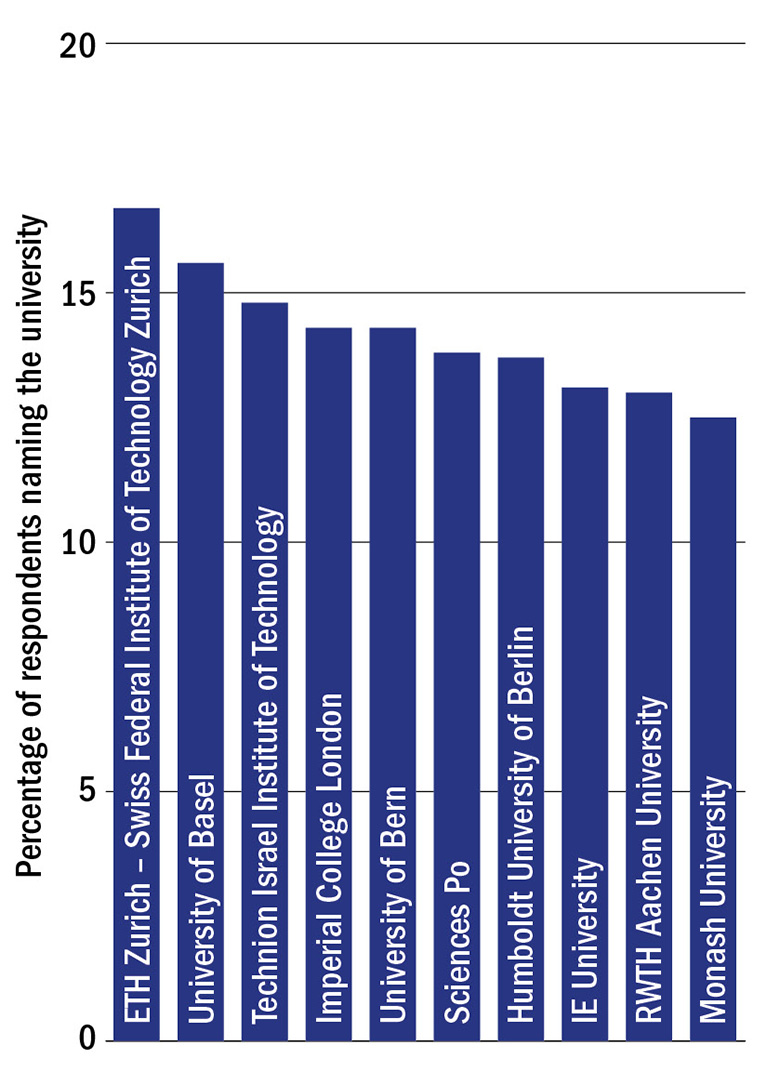
Note: Respondents could name more than one university
The centre’s head, Evelyne Kappel, says that the industrial sponsorship makes it “really important to [demonstrate] that we are totally independent”. As a result, the centre does not broker work placements. But the platform system is still very valuable since students often simply want to ask a company: “What am I going to do the whole day if I work for you?”
It is also vital, Kappel says, that those working for the careers centre have a background in industry: “We understand students but we also know what is going on in industry. We would not hire someone in our team who has only worked in academia for 20 years.”
The results from the survey make clear that, in general, employers see corporate links as one of the areas that universities most need to improve on (see graph below). And Dupasquier points out that some of the countries that perform well in the employability ranking are those whose universities have a longer history of industry links. This, he says, is one reason that UK institutions do not do as well in the employability ranking as they do in research-led rankings, whereas countries such as France do better.
How important are the following when choosing the universities you recruit from? How satisfied are you with the universities in your country regarding these aspects?
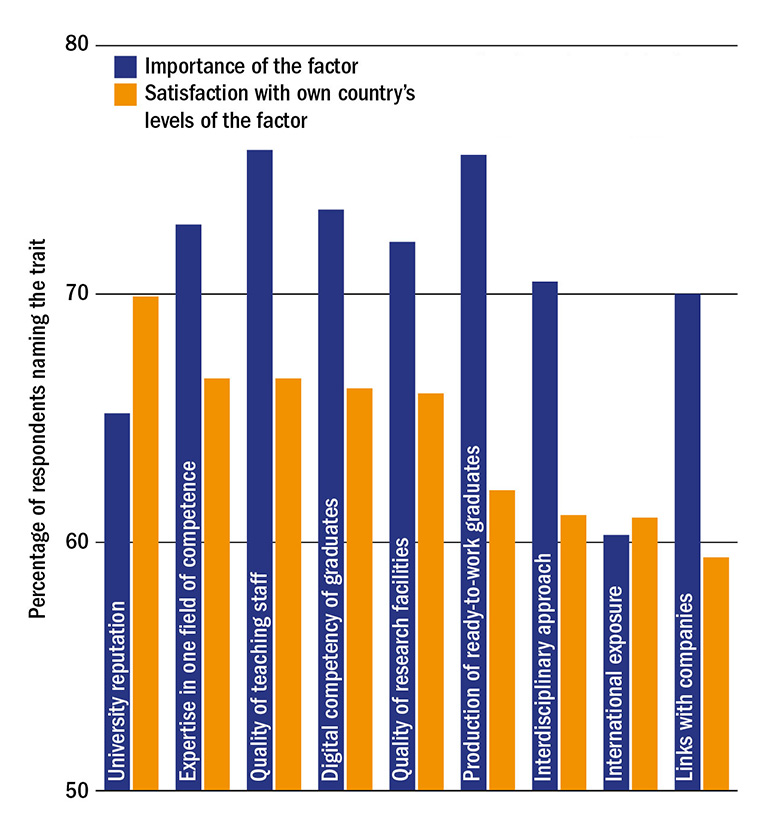
Note: Respondents ranked each area on a six-point scale. The graphic shows the percentage of respondents picking values five and six for each area, with six being the most important.
“The whole system of the grandes écoles [in France] has been designed around the idea of employability. Their main focus is not research,” he says. So while French higher education institutions struggle to make an impact in international university rankings, French business schools always place highly in specialist business school rankings: “It is because, from the start, they have formed relationships with companies.”
Even the UK’s most elite universities have generally fallen in the employability ranking this year, while developing countries such as China continue to rise. The University of Cambridge still ranks fifth (down from fourth), but the University of Oxford – which has headed the THE World University Rankings for the past two years – has fallen eight places to 15th.
Dupasquier wonders whether Brexit forms part of the explanation. If intercultural understanding is indeed an important graduate attribute, the UK’s withdrawal from the world’s most prominent international trading bloc might well be thought to be quite a blow to its graduates’ employability if it means that they can no longer participate, for instance, in the Erasmus student exchange scheme. But, for Dupasquier, the explanation has more to do with the implications of Brexit for the academic attractiveness of British universities, given the significant role that reputation plays in employers’ estimation of them.
“It is obvious that Brexit has huge implications for the higher education system in the UK,” he says. “As well as the draw of learning the language, the UK was an open and welcoming place to study. Whether this is still the case has been put into doubt.”
For UK graduates, it seems, a decline in the country’s educational cachet could pose just as serious a threat to their future employability as robots and computers do.
Global University Employability Ranking 2017
Search institution name or country to filter by that nation
NR = not ranked; Note that École Normale Supérieure and Mines ParisTech are now part of Paris Sciences et Lettres – PSL Research University Paris

Global University Employability Ranking 2017 methodology
To produce the Global University Employability Ranking, an online survey was completed by two panels of participants between May and September 2017.
Both panels included respondents from 22 countries: Argentina, Australia, Austria, Brazil, Canada, China, France, Germany, India, Israel, Italy, Japan, Mexico, the Netherlands, Singapore, South Africa, South Korea, Spain, Turkey, the United Arab Emirates, the UK and the US.
The first panel consisted of about 2,500 recruiters at a management level who had experience of hiring or working with graduates. Each person was given a list of local universities (with the option to add more) and had up to 15 votes to cast for the universities in their countries that “produce the best graduates in terms of employability”. The sample size of recruiters from each country was determined by the country’s number of university students, GDP and number of institutions. Participants with experience of recruiting internationally were also asked to select from a global list of universities that they considered “the best in the world when it comes to graduate employability”.
The second panel consisted of about 3,500 managing directors of international companies. Participants could cast a maximum of 10 votes on both the local and global lists of universities that had been produced by the first panel. They could also add universities from a database.
Votes were then aggregated into scores for each university to produce the ranking.
Most participants had at least 10 years’ experience in the workplace and worked at firms with more than 500 employees. More than 30 per cent had experience recruiting in the business sector, just under 30 per cent had experience in the IT sector, and almost 20 per cent worked in the engineering industry. More than half recruited internationally.
The survey was designed by the French human resources consultancy Emerging, and has been conducted for the past seven years by employment research institute Trendence. It has been published exclusively by Times Higher Education since 2015.
POSTSCRIPT:
Print headline: The world’s most employable graduates
Register to continue
Why register?
- Registration is free and only takes a moment
- Once registered, you can read 3 articles a month
- Sign up for our newsletter
Subscribe
Or subscribe for unlimited access to:
- Unlimited access to news, views, insights & reviews
- Digital editions
- Digital access to THE’s university and college rankings analysis
Already registered or a current subscriber?




